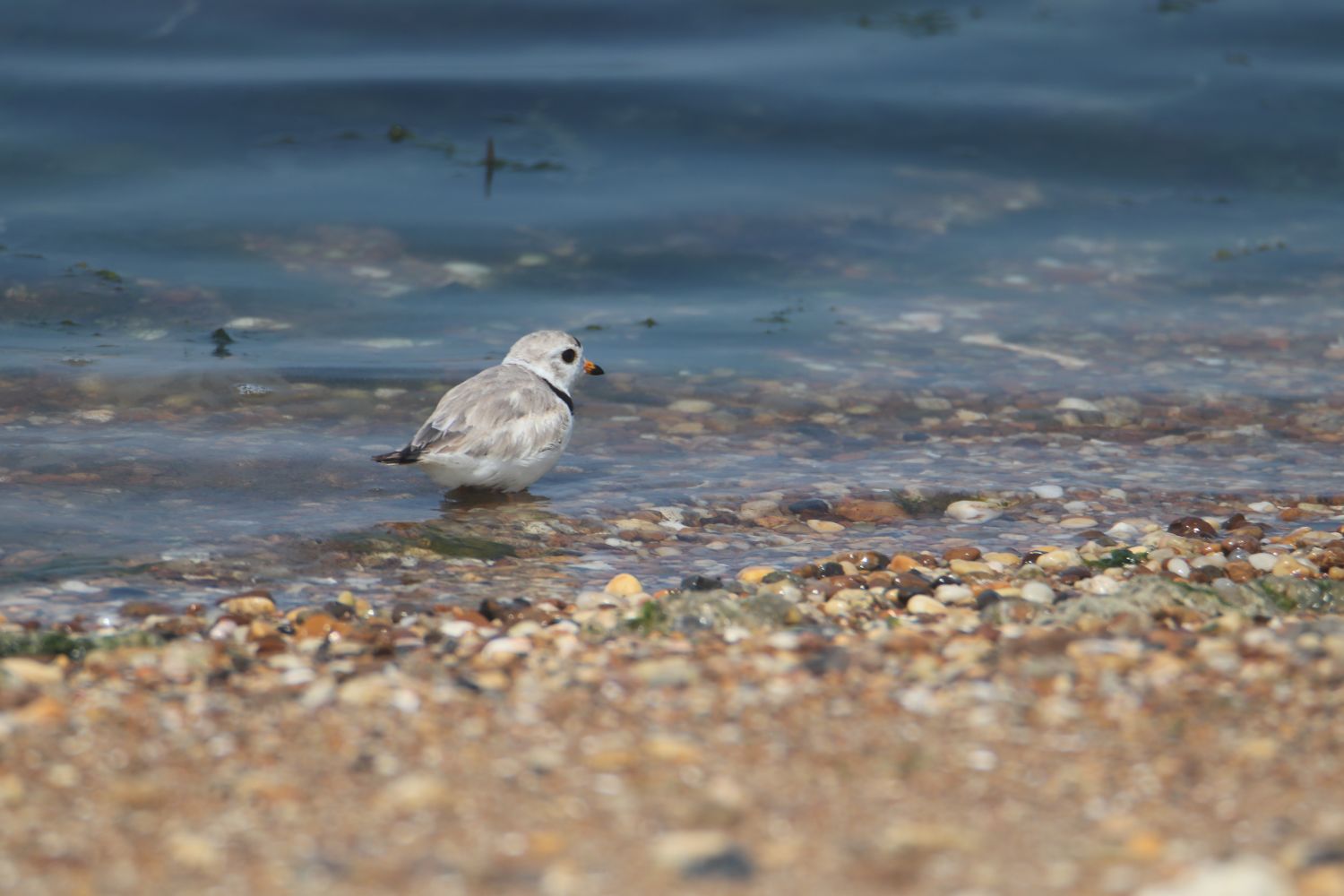DNREC, USFWS and Tri-State Bird Rescue Collaborate to Rehab Adult Piping Plover

“Nomad,” an adult piping plover that had spent much of his migratory life on Delaware beaches, went further inland for rehabilitation recently at Tri-State Bird Rescue in Newark after sustaining an injury at Fowler Beach on Prime Hook National Wildlife Refuge. Through the efforts of DNREC, the U.S. Fish and Wildlife Service and Tri-State, Nomad (depicted above just after his release in July) has made his way back to a healthy beach-nesting lifestyle at The Point on Cape Henlopen. /Delaware DNREC photo: Sarah Geisler
Successful Effort Helps Protect and Possibly Expand a Delaware Species of Greatest Conservation Need
The Department of Natural Resources and Environmental Control has collaborated with Tri-State Bird Rescue & Research and U.S. Fish and Wildlife Service biologists to successfully release a rehabilitated piping plover originally rescued at Fowler Beach in Prime Hook National Wildlife Refuge. Piping plovers are federally-listed as a threatened species and as a Species of Greatest Conservation Need and endangered in Delaware.
The rehabbed plover is an adult male banded at Assateague Island National Seashore in 2023 with a unique-coded leg flag, Green 6YP, and known by the nickname “Nomad.” The male plover, which has been nesting at Fowler Beach since 2024, was observed on June 30 unable to fly or walk, but relatively alert and with no obvious injuries – the result, DNREC and USFWS wildlife biologists believe, of a high stress event for the piping plover, possibly muscle damage caused by a predator’s extended pursuit.
Upon making that determination, biologists at Prime Hook National Wildlife Refuge decided to capture the bird by hand and transport it to DNREC conservation partner Tri-State Bird Rescue & Research in Newark, Del., where the plover Nomad received immediate veterinary care. Within a week of starting rehabilitation there, Nomad was deemed in good condition and ready to be released.
The coordinated effort from the DNREC Division of Fish and Wildlife, the DNREC Division of Parks and Recreation, Prime Hook National Wildlife Refuge and Tri-State culminated with Nomad transported in July to The Point at Cape Henlopen State Park and released at one of two active piping plover breeding areas in Delaware. The Point currently experiences lower pressure from predators than Fowler Beach, and according to sighting data has been frequented by Nomad over the past two years.
Since his release, Nomad has been observed foraging and behaving as expected for a healthy adult piping plover. “Every individual matters for this vulnerable species, and the major effort between partners to return this bird to the breeding population was an excellent example of collaboration in conservation,” DNREC Coastal Waterbird Biologist Kat Christie said about getting Nomad released back into the Delaware piping plover population.
As a federally-listed threatened species, piping plovers are faced with a declining population in the southern part of their range. Prime Hook National Wildlife Refuge, with the largest population of nesting piping plovers in Delaware, also is known to help augment the plover populations of some of the hardest-hit beaches in New Jersey, Maryland, Virginia and North Carolina.
For more information on DNREC’s efforts to protect piping plovers and other beach-nesting bird species, including volunteer beach steward opportunities, visit the DNREC website or email Coastal Waterbird Biologist Kat Christie and her team at deshorebirds@delaware.gov.
About DNREC
The Delaware Department of Natural Resources and Environmental Control protects and manages the state’s natural resources, protects public health, provides outdoor recreational opportunities and educates Delawareans about the environment. The DNREC Division of Fish and Wildlife conserves and manages Delaware’s fish and wildlife and their habitats, and provides fishing, hunting, wildlife viewing and boating access on more than 68,000 acres of public land. The DNREC Division of Parks and Recreation oversees more than 26,000 acres in 17 state parks and the Brandywine Zoo. For more information, visit the website and connect with @DelawareDNREC on YouTube, Facebook, Instagram, X (formerly known as Twitter) or LinkedIn.
Media contact: Michael Globetti, michael.globetti@delaware.gov
###
Legal Disclaimer:
EIN Presswire provides this news content "as is" without warranty of any kind. We do not accept any responsibility or liability for the accuracy, content, images, videos, licenses, completeness, legality, or reliability of the information contained in this article. If you have any complaints or copyright issues related to this article, kindly contact the author above.
